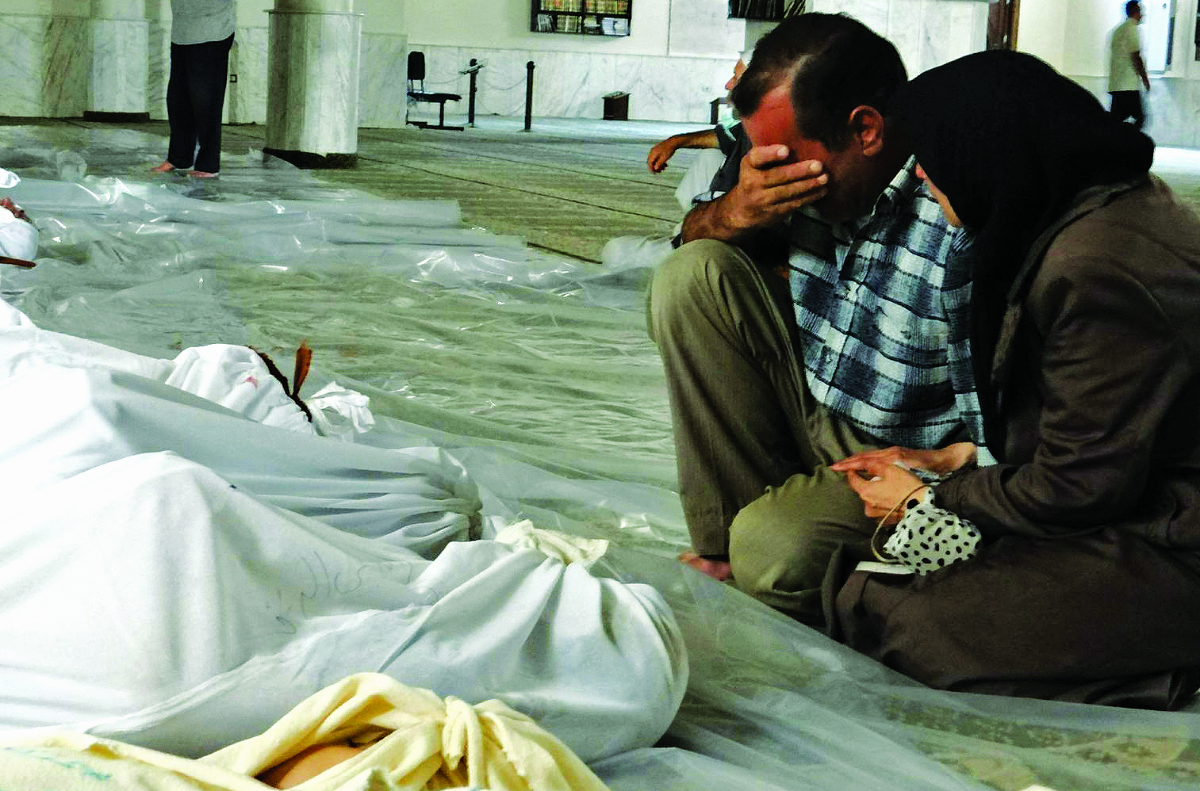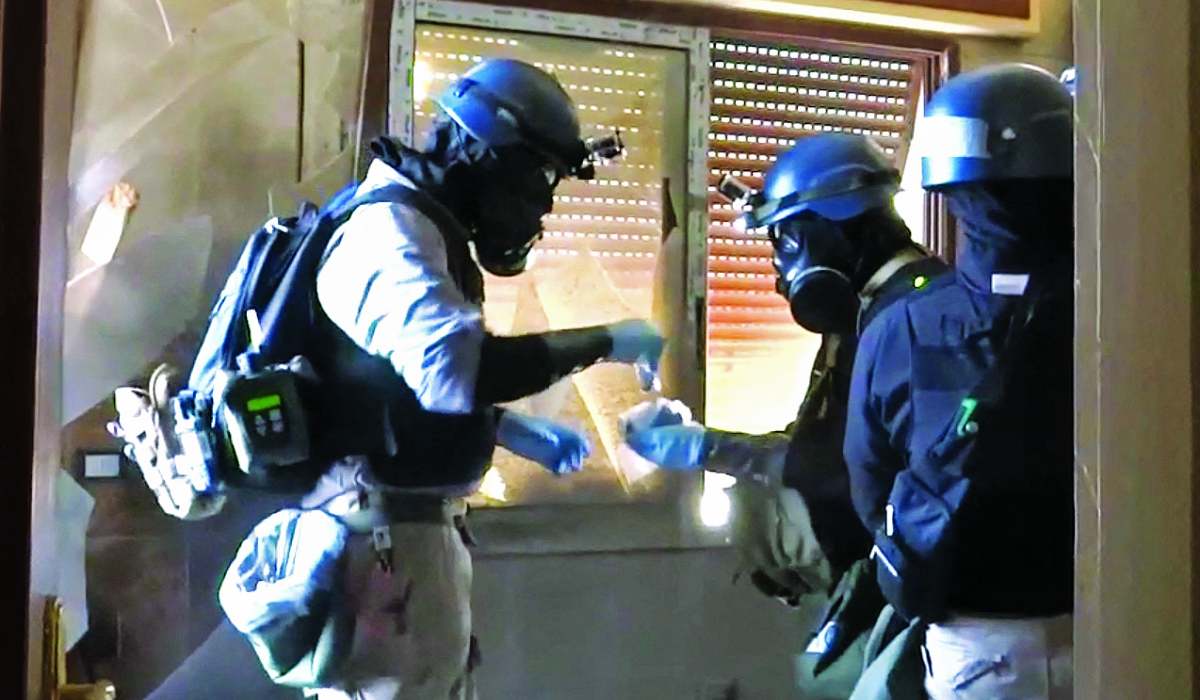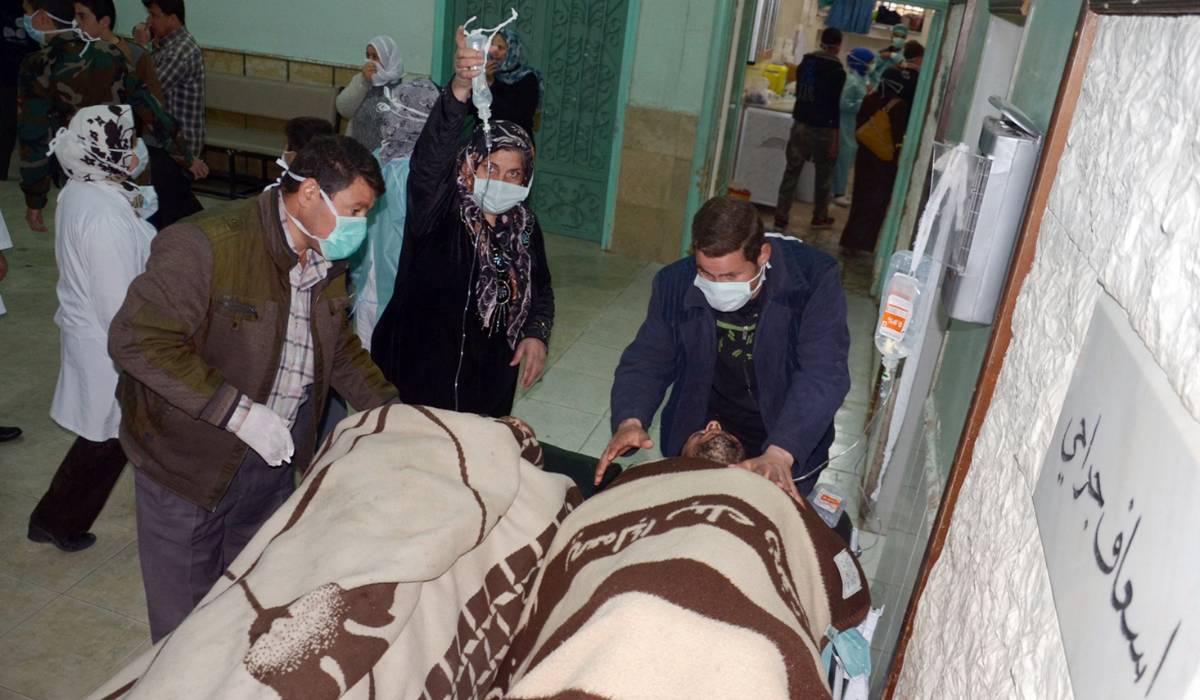LONDON: In August 2012, exactly two months after the UN had officially declared Syria to be in a state of civil war, US President Barack Obama made a pledge that he would ultimately fail to keep, and which would overshadow the rest of his presidency.
Since the beginning of protests against the government of Bashar Assad, Syria’s armed forces had been implicated in a series of attacks using banned chemical weapons.
During a press briefing in the White House on Aug. 12, Obama was asked if he was considering deploying US military assets to Syria, to ensure “the safe keeping of the chemical weapons, and if you’re confident that the chemical weapons are safe?”

A Syrian couple mourning in front of bodies wrapped in shrouds ahead of funerals following what Syrian rebels claim to be a toxic gas attack by pro-government forces in eastern Ghouta, on the outskirts of Damascus on August 21, 2013. (AFP)
Obama replied that he had “not ordered military engagement in the situation. But … we cannot have a situation where chemical or biological weapons are falling into the hands of the wrong people.”
The US, he said, was “monitoring that situation very carefully. We have put together a range of contingency plans. We have communicated in no uncertain terms with every player in the region that that’s a red line for us and that there would be enormous consequences if we start seeing movement on the chemical weapons front or the use of chemical weapons.”
In the event, Obama stepped back from the action he had threatened — with devastating consequences for hundreds of Syrians.
INNUMBERS
360+
Tonnes of mustard gas missing from Syria despite admission of its existence in 2016.
5
Tonnes of precursor chemicals used to make the nerve agent sarin also unaccounted for.
Despite Syrian promises and, as part of a deal brokered by its ally Russia, commitments it made in 2012 by joining the Chemical Weapons Convention in a successful bid to stave off US military intervention, experts from the Organization for the Prohibition of Chemical Weapons (OPCW) believe that stocks of chemical weaponry still exist in the country.

Medics and other masked people attend to a man at a hospital in Khan al-Assal in the northern Aleppo province, as Syria's government accused rebel forces of using chemical weapons for the first time. (AFP)
With the fall of Damascus and the toppling of the Assad regime, the whereabouts of those weapons is a matter of great concern.
The nightmare scenario feared by the OPCW is that the weapons will fall into the hands of a malign actor. Among the missing chemicals, the existence of which was admitted by the Syrian authorities in 2016, is more than 360 tons of mustard gas, an agent used to such devastating effect during the First World War that it was among the chemicals banned by the Geneva Protocol in 1925.
Also unaccounted for, according to a confidential investigation leaked to The Washington Post, are five tons of precursor chemicals used to make the nerve agent sarin. When pressed by investigators to explain where it had gone, the Syrians told OPCW investigators it had been “lost during transportation, due to traffic accidents.”

United Nations (UN) arms experts collecting samples as they inspect the site where rockets had fallen in Damascus' eastern Ghouta suburb during an investigation into a suspected chemical weapons strike near the capital. (AFP)
On Thursday, the OPCW said it was ready to send investigation teams to Syria as soon as safe access to the country could be negotiated.
Reassurance has been offered by Hayat Tahrir Al-Sham, the armed group that toppled the Assad regime and has now set up an interim government, that it has “no intention to use Assad’s chemical weapons or WMD (weapons of mass destruction), under any circumstances, against anyone.”
In a statement issued on Dec. 7, it added: “We consider the use of such weapons a crime against humanity, and we will not allow any weapon whatsoever to be used against civilians or transformed into a tool for revenge or destruction.”
There would be enormous consequences if we start seeing movement on the use of chemical weapons.
Barack Obama, Former US president in 2012
The fact that chemical weapons might still exist in Syria at all is testimony to the failure of international efforts to rid the country of them back in 2012.
“Whether Obama had meant to say that these were real red lines, or they’re sort of pinkish lines, everybody in the region thought they were red lines,” Sir John Jenkins, former British ambassador to Syria, Saudi Arabia, and Iraq, who was in Saudi Arabia at the time, told Arab News.
“That whole episode was pretty squalid. The fact was, Obama didn’t want to get into any sort of conflict, even restricted action, involving Syria — and a lot of that was the legacy of Iraq — and the Russians gave him an excuse.”

Barack Obama, Former US president in 2012
In August 2013, almost one year after Obama’s “red line” pledge, as the civil war raged and the civilian death toll mounted into the tens of thousands, shocking photographs emerged of child victims of chemical attacks carried out against areas held by militant groups in the eastern suburbs of Damascus.
By chance, a UN inspection team was already in the country, having arrived on Aug. 18 to investigate reports of several earlier chemical weapons attacks, in Khan Al-Asal and Sheik Maqsood, Aleppo, and Saraqib, a town 50 km to the southwest.
Instead, the inspectors headed to Ghouta. After interviewing survivors and medical personnel, and taking environmental, chemical and medical samples, they concluded there was no doubt that “chemical weapons have been used … against civilians, including children on a relatively large scale.”

A picture downloaded from Brown-Moses' blog, a Leicester-based blogger monitoring weapons used in Syria, on August 30, 2013, shows the size of the back of a rocket used in the alleged chemical attack on Damascus' eastern Ghouta suburb. (AFP)
Sarin, a highly toxic nerve agent, had been delivered by artillery rockets.
On Aug. 30, 2013, the White House issued a statement concluding with “high confidence” that the Syrian government had carried out the attacks, which had killed at least 1,429 people, including 426 children.
Obama’s “red line” had clearly been crossed. But the promised “enormous consequences” failed to materialize.
In a televised address on Sept. 10, 2013, Obama said he had determined that it was in the national security interests of the US to respond to the Syrian government’s use of chemical weapons through a targeted military strike, “to deter Assad from using chemical weapons … and to make clear to the world that we will not tolerate their use.”
But in the same speech, the president made clear that he had hit the pause button.
Because of “constructive talks that I had with President Putin,” the Russian government — Assad’s biggest ally — “has indicated a willingness to join with the international community in pushing Assad to give up his chemical weapons.”

People are brought into a hospital in the Khan al-Assal region in the northern Aleppo province, as Syria's government accused rebel forces of using chemical weapons for the first time. (AFP)
The Syrian government had “now admitted that it has these weapons, and even said they’d join the Chemical Weapons Convention, which prohibits their use.”
As part of the unusual collaboration between the US and Russia, later enshrined in UN Resolution 2118, the threatened US airstrikes were called off and on Oct. 14, 2013 — less than two months after the massacre in Ghouta — Syria became the 190th state to become a party to the Chemical Weapons Convention, administered by the OPCW.
Syria’s accession to the convention was supposed to lead to the total destruction of its chemical weapons stockpiles.
The fact was, President Obama didn’t want to get into any sort of conflict, even restricted action, involving Syria.
Sir John Jenkins, former British ambassador to Syria, Saudi Arabia, and Iraq
At first, everything seemed to be going to plan. On Jan. 7, 2014, the OPCW announced that the first consignment of “priority chemicals” had been removed from Syria. The chemicals were transported from two sites and loaded onto a Danish vessel, which left the port of Latakia.
Transporting these materials, said then-director-general of the OPCW Ahmet Uzumcu, was “an important step … as part of the plan to complete their disposal outside the territory of Syria.”
He added: “I encourage the Syrian government to maintain the momentum to remove the remaining priority chemicals, in a safe and timely manner, so that they can be destroyed outside of Syria as quickly as possible.”
In fact, as a joint statement by the US and 50 other countries a decade later would declare, “10 years later, Syria, in defiance of its international obligations, has still not provided full information on the status of its chemical weapons stockpiles.”
Not only that, added the statement on Oct. 12, 2023, investigations by the UN and the OPCW had established that Syria had been responsible “for at least nine chemical weapons attacks since its accession to the CWC in 2013,” demonstrating that “its stockpiles have not been completely destroyed and remain a threat to regional and international security.”
Over a year on, little has changed. In a speech to the EU Disarmament and Non-Proliferation Consortium in Brussels on Nov. 12, the director-general of the OPCW admitted the organization’s work in Syria was still not complete.
“For more than 10 years now,” said Fernando Arias, the organization’s Declaration Assessment Team “has strived to clarify the shortcomings in Syria’s initial declaration.”
Of 26 issues identified, “only seven have been resolved, while 19 remain outstanding, some of which are of serious concern,” and two of which “relate to the possible full-scale development and production of chemical weapons.”
This may have occurred at two declared chemical weapons-related sites where, according to Syria, no activity was supposed to have taken place but where OPCW inspectors had detected “relevant elements.” Questions put to Syria had “so far not been answered appropriately.”
Under the Convention, Syria is obliged to submit “accurate and complete declarations” of its chemical weapons program. The OPCW’s mandate, said Arias, “is to verify that this has indeed happened, and so far, we have not been able to do so.”
Meanwhile, the organization’s fact-finding mission “is gathering information and analysing data regarding five groups of allegations covering over 15 incidents,” while investigators have issued four reports to date linking the Syrian Armed Forces to the use of chemical weapons in five instances and the terrorist group Daesh in one.
This, said Arias, “highlights the ever-present risk posed by non-state actors … acquiring toxic chemicals for malicious purposes.”
“Everyone knew there were still secret sites, undeclared sites,” Wa’el Alzayat, a former Middle East policy expert at the US Department of State, told Arab News.
“Even the US intelligence community had assessments that there were still other facilities and stockpiles, but the more time passed, and with the change of administration, the issue not only got relegated but new political calculations came into place, particularly, I would say, during the Biden years, and also because of pressure from some neighboring countries that wanted to normalize with Assad and bring him back in from the cold.”
Twelve years on from Obama’s failure to act over Syria’s crossing of his infamous “red line,” it seems that an American intervention is once again unlikely in Syria.
Right before the fall of the regime, US intelligence agencies, concerned that Syrian government forces might resort to the use of chemical weapons to stall the advance of militant groups, let it be known that they were monitoring known potential storage sites in the country.
Just before the sudden collapse of the Assad regime, both the Biden and the incoming Trump administrations signalled a lack of willingness to become embroiled in the conflict.
President-elect Trump, employing his trademark capital letters for emphasis, posted on social media that the US “SHOULD HAVE NOTHING TO DO WITH” the “mess” that is Syria. “THIS IS NOT OUR FIGHT,” he added. ‘LET IT PLAY OUT.”
It remains to be seen whether the sudden collapse of the Assad regime has altered this calculation. What is certain, however, is that chemical weaponry remains at large in Syria and HTS is now under international pressure to allow OPCW inspectors into the country, for the sake of the entire region.



























